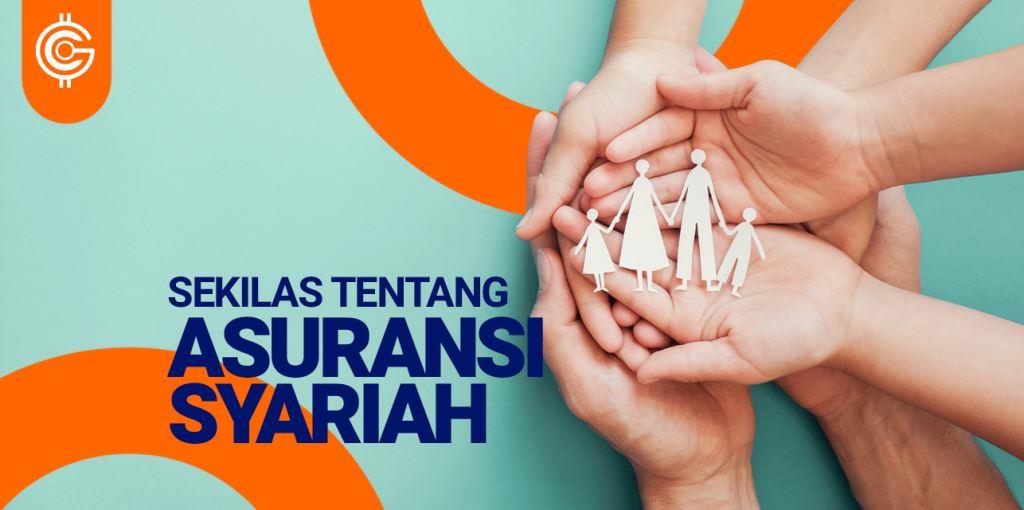The many types of insurance allow us to choose which insurance is right for us to use. These insurances will later help us if something unwanted happens in the future. This time we will discuss one type of insurance that is in great demand by people, namely the sharia type. Sharia insurance is a type of insurance whose application is based on Islamic sharia. For those of you who are a little worried about conventional insurance about its application to Islam, then this type of sharia will help you in carrying out Islamic law. For more information about this sharia insurance, you can understand it through the discussion below.
What is the Definition of Sharia Insurance?
Based on the fatwa of DSN MUI 21/DSN-MUI/X/2001 concerning the General Guidelines for Sharia Insurance, the definition of sharia insurance itself is an effort to help and share among a number of people or parties through investment in the form of assets or
tabarru' which provides a pattern of return to face certain risks by using contracts that are in accordance with sharia. Sharia insurance uses the principle of
sharing of risk, where the risk from one person/party is charged to all people/parties who are policyholders, while conventional insurance uses a
transfer of risk system where the risk from the policyholder is transferred to the insurance company. Therefore, it can be concluded that the role of the insurance company itself is to carry out operational management and investment of a number of funds received from policyholders, in contrast to conventional insurance companies that act as risk bearers. The contract used in sharia insurance uses the principle of help-help between fellow policyholders and representatives/cooperation of policyholders with sharia insurance companies. Meanwhile, the contract used by conventional insurance is based on the principle of exchange (buying and selling).
What is the Difference Between Sharia and Conventional Insurance?
The main difference between the two insurances is the management concept. Sharia protection has the concept of
Sharing Risk management, while conventional insurance has the concept of
Transfer Risk management. The concept of conventional insurance management in the form of transfer risk is protection in the form of transferring economic risk to the insured person to the insurance company as a risk bearer. Or in other words, participants who buy or join as conventional insurance participants, will later be borne the economic risk by the insurance company. Meanwhile, risk sharing, which is the management of sharia insurance, is a concept where the participants have the same goal, namely in accordance with sharia, which is represented by the management to the company in exchange for
Ujrah.
Sharia Insurance Law
There is a law enacted regarding this sharia insurance. These laws have been in accordance with the provisions of the Al Quran and also in accordance with the fatwa enforced by the Indonesian Ulema Council. The laws are:
Sharia Insurance Law in Islam and According to the Quran
There are three legal bases of insurance in Islam contained in the Quran and Hadith along with their evidence. The laws are:
- Surah Al Maidah verse 2 which reads "And help you in virtue and piety, and do not help in sins and transgressions."
- Surah An Nisaa verse 9 which reads "And fear Allah those who should leave behind them weak children whom they fear."
- And lastly, there is a hadith narrated by a Muslim from Abu Hurairah who said, "Whoever releases from a Muslim a hardship in the world, Allah will relieve him of his hardships on the Day of Resurrection."
From these three legal bases, it can be concluded that insurance law in Islam is permissible, as long as it aims to help and does not contain the prohibited element of riba.
Sharia Insurance Law According to the Indonesian Ulema Council (MUI)
The law of this insurance is clearly declared halal by the Indonesian Ulema Council. As long as it is still guided by Islamic law which prioritizes helping and protecting, and not business interests that benefit one of the two parties. However, the presence of insurance itself for most Muslims in Indonesia is still a pro and con. Even though they carry the concept of Islamic sharia, they still question Islamic sharia law whether it is halal or haram. For people who think that this insurance law is haram, they state that there is an element of riba and unclarity in its application. In fact, the Indonesian Ulema Council has emphasized that the sharia insurance law is halal and has been stated in the fatwa of DSN MUI 21/DSN-MUI/X/2001 concerning the General Guidelines for Sharia Insurance, where the principle rejects conventional insurance and allows sharia insurance. In its explanation, the fatwa prohibits companies from investing participant funds in things that are prohibited by Islamic law. So it can be concluded that sharia insurance is an insurance whose application is based on sharia principles by trying to help (ta'awun) and protect each other (takaful) among participants through the formation of a collection of funds (tabarru' funds) which are managed in accordance with sharia principles to face certain risks.
Sharia Insurance Concept
As previously explained, there are several things that underlie the concept of sharia-based insurance, namely the element of helping with
Tabarru' funds which allows the funds to be lent to participants without any element of coercion. In addition, the funds deposited by participants will not be forfeited if the deposit period expires and will be returned. All insurance procedures are based on contracts that are in accordance with Islamic law.
Purpose of Sharia Insurance
In conventional insurance companies, their main goal is purely business. Like most other businesses their goal is to make a big profit. This can be seen from the funds obtained from customer premiums, all of which will belong to the company. As for sharia insurance, their main goal is not to get a big profit. Rather, the main purpose of sharia insurance is to seek profits by improving the welfare and struggle of the people. This can be seen from the vision and mission carried out by sharia insurance companies, namely, the mission of aqidah, the mission of worship, the mission of iqtisadi, and the mission of the ummah. The difference in purpose between conventional insurance and sharia insurance will affect the business implementation of the insurance. The same transaction between the two insurances can be recognized differently. This is due to the difference in the goals that must be achieved by conventional insurance and also sharia insurance.
Contract in Sharia Insurance
Based on the DSN-MUI fatwa regarding contracts in sharia insurance, there are 4 types of contracts, namely tabarru' contracts, tijarah contracts, wakalah bil Ujrah contracts, and mudharabah musytarakah contracts. The contracts will be explained further below.
Tabarru' Contract
Tabarru' also means grant or help. Insurance participants provide grants that will be used to help other participants affected by disasters, while this insurance company acts as the manager of the grant funds.
Tijarah Contract
This tijarah contract is also commonly referred to as mudharabah. In this contract, the insurance company is the mudharib or manager, and the participant is the shahibul mall or policyholder. The premium from this contract can be invested and the profit from the investment is distributed to the participants.
Mudharabah Musytarakah Contract
This contract is a development of the mudharabah contract, where the insurance company is a
mudharib and also includes the funds in the investment along with the participant's funds. The investment profit share will be distributed between the insurance company and the participant according to the agreed ratio according to the
nisbah of their respective funds.
Wakalah bil Ujrah Contract
This agreement gives power of attorney from the participant to the insurance company to manage the participant's funds in exchange for giving
ujrah or fee (payment). The insurance company as a representative can invest the premiums given, but is not entitled to get a share of the investment proceeds itself.
Benefits of Sharia Insurance
There are several benefits of sharia insurance itself. You can get this benefit if you use this insurance. The following are some of the benefits of sharia insurance for those who use it. The benefits of such insurance are:
The Principle of Help- Helping
In conventional insurance, customers pay premiums to the insurance company so that they can get compensation in the event of insured risks. This concept is called risk transfer or risk transfer. Which means, the risks that all belong to customers are now covered by insurance. Meanwhile, the risk of sharia insurance is risk sharing as previously explained, where each participant pays a contribution so that a set of funds is collected that will be managed by the insurance company. Later, the funds will be distributed to participants who experience disasters and need money.
Free of Riba
Some people say that conventional insurance still contains usury, because its activities involve exchanging assets for assets whose nominal value is not commensurate (customer premiums with claims paid by insurance. This is where there are benefits of sharia insurance for the insured that are superior to conventional, namely free from usury. The reason is, the contract in this product is not to exchange premiums for claim money, but to work together between fellow participants. If there are participants who experience a disaster, then the collected contributions of the participants can be used to help him.
Premiums Won't Be Forfeited
The next benefit of sharia insurance for the insured is that the premiums or contributions deposited by the insurance participant will not be forfeited. In contrast to conventional insurance, sharia insurance will return the participant's contribution if there are no claims during the coverage period. This sharia insurance risk scheme is referred to as risk sharing. With the intention that the risks owned by each insurance participant will be borne together.
You Can Make a Double Claim
The benefits of double claim sharia insurance are usually offered by several companies. If you are sick and BPJS Kesehatan only covers part of it, then you can apply for the rest to the sharia health insurance company. However, not all of these sharia insurance products offer these benefits. So, you need to confirm it first with the agent.
Free Basic Contributor if Unable to Pay
Another benefit of sharia insurance is the freedom to make basic contributions if the participant experiences a total disability due to illness or accident. To get this facility on conventional insurance, you have to pay more premiums. However, the advantage of sharia insurance is something that you can get for free.
More Transparent in Management
The management of funds in sharia insurance is transparent, that is, it has been determined from the beginning. So, customers will understand where the participants' contribution funds will be allocated. For example, there are funds allocated for investments, and there are also funds allocated for claims reserves.
Protection does not change even if you pay late
If the participant is late in paying the insurance contribution, then the insurance function runs as it should without any termination of benefits. Meanwhile, in conventional health insurance, customers will be subject to a series of sanctions such as blocking participant status if they pay late.
Management of Mandatory Funds Based on Islamic Sharia
As the name implies, the management of the funds of this group of participants will also be managed based on existing Islamic law. For example, the funds are not invested in companies that are not in accordance with Islamic principles, such as gambling or alcohol producers.
Customers Get a Fair Share of Profits
A portion of the pool's funds will be invested by insurance companies. The profits obtained from the investment will be distributed fairly to each customer. Unlike conventional insurance, the investment results are only accepted by the company. In addition, the surplus underwriting or the difference and collected with the total claims of participants will also be distributed to the participants according to their respective portions.
Waqf
Waqf is one of the benefits of sharia insurance for people that are not in conventional insurance. The meaning of waqf itself is the handover of property that lasts for a long time to the beneficiary as a form of virtue. So sharia insurance products allow their participants to participate in kindness.
Types of Sharia Insurance
Every sharia-based insurance company in Islam will provide a lot of choices regarding what sharia insurance products are offered. You can understand these types of insurance as follows:
Individual Takaful
Individual Takaful is a product that provides protection and planning that is personal. This type of individual takaful is also divided into several options, namely:
- Sharia Investment Fund Takaful. This product guarantees and provides old-age protection or is a guarantee of funds for heirs if the customer dies early. This product also includes protection for the family.
- Takaful Dana Haji. This product provides protection for the funds of individuals who plan to perform the hajj.
- Takaful Dana Siswa. This product guarantees education funds ranging from elementary school to undergraduate.
- Takaful Dana Position. This product guarantees compensation for the heirs of customers who occupy important positions if the customer dies early.
Group Takaful
Group Takaful is a product that provides protection and planning that is group within the company. This type is also divided into several options, namely:
- Takaful al-Khairat and Hajj Savings. Providing protection for employees who want to perform the hajj with funding through contributions along with rotating departures.
- Student Accident Takaful. Protection of students from the risk of accidents that result in disability and even death.
- Travel and Travel Takaful. Protect tour participants from the risk of accidents that result in disability or death.
- Takaful Accident Group. Employee compensation protection in a company or organization.
- Takaful Financing. Debt repayment protection for customers who pass away during the agreement period.
General Takaful
General Takaful is a sharia-based insurance that provides general protection and planning. This type is also divided into several types, namely:
- Fire Takaful. Protection from losses caused by fire.
- Motor Vehicle Takaful. Protection against losses to motor vehicles.
- Engineering Takaful. Protection against losses in construction work.
- Transportation Takaful. Loss protection for all goods after being transported by land, sea, or air.
- Ship Hull Takaful. Protection against damage to the ship's engine and ship frame caused by accidents or calamities.
Examples of Products and Companies That Provide the Best Sharia Insurance
There are many sharia insurance companies in Indonesia that offer the best insurance products. However, there are only a few companies that provide the best sharia insurance. The following are some examples of the best sharia insurance products and companies in Indonesia, namely:
Manulife Syariah
This International insurance company has had a good reputation for a dozen years. And Manulife Syariah insurance products are one of the best by using a cashless system and reimbursement options for its customers. Some of the sharia insurance products that can be chosen from Manulife include:
- Manulife Berkah Crisis Cover Protection
- Berkah Payor Income Replacement
- Berkah Yearly Renewable Term
- Berkah Waiver of Basic Contribution
- Berkah Accidental Death and Disability Benefit
FWD Life
FWD Life comes with a sharia family health insurance product called Bebas Handal insurance which has used a cashless system and can be purchased online.
BNI Life Syariah
BNI Life Syariah is one of the investment products developed by BNI. BNI also launched BNI Life Syariah with Islamic sharia principles for education investment, plus investment, and multi investment. For the life insurance business, BNI Life Syariah issues sharia life products and sharia health plans.
PRU Syariah
This leading insurance subsidiary of Prudential on an international scale also has a sharia-based insurance product under the name PRU Syariah. There are many choices of sharia-based insurance products offered by Prudential, making it easier for customers to invest.
Sunlife
This sharia-based insurance product issued by Sunlife is Sun Medical Platinum which provides benefits of up to IDR 7.5 billion for chemotherapy treatment and pain recovery.
Panin Syariah
Bank Panin, which is already well-known for its credibility, also has sharia-based insurance offerings. This insurance from Panin is called Panin Syariah. In fact, Panin Syariah has received an award as the best sharia insurance in Indonesia according to Investor magazine.
Simas Syariah
Simas Syariah Unggulan aims to provide attractive and optimal investment value growth in the long term through portfolio investment in Sharia Equity Securities as well as Sharia Debt Securities, Sharia Asset-Backed Securities and/or Sharia Money Market Instruments that are in accordance with applicable laws and regulations and follow Islamic Sharia principles.
How Sharia Insurance Works
There is a way of working or applying this sharia insurance system. It should be remembered again that the basic principle of sharia insurance is to help who will solve a participant's problem by mutual cooperation using social funds. This way of working will be very different from conventional insurance and of course will affect the benefits obtained later along with the risks. Some of these ways of working can be divided into several sides, namely:
Fund Ownership Side
In terms of fund ownership, both conventional and sharia insurance have different systems of ownership and fund management. Participants have full rights to ownership of funds, while the company only stands as a manager by prioritizing transparency. On the other hand, conventional insurance companies have full rights over the allocation of funds and investments of insurance participants.
Forms of Investment
In terms of investment, the way sharia insurance works focuses on a profit-sharing system and is usually distributed to financial institutions that are also sharia-based, while conventional insurance manages investments in the form of interest. In addition to being distributed to institutions that are not limited to those that comply with sharia, the return is also adjusted to the percentage charged to the borrower.
Sharia Insurance Uses Premiums or Contributions?
Sharia-based insurance runs with a
sharing of risk system, which is to grant part or all of the contribution called Tabarru' funds. The Tabarru' fund is a fund used to pay claims if something happens to the participant. So the term used is a contribution in accordance with the conditions that have been determined, not insurance premiums.
About Dana Tabarru'
There are several ways that are commonly used in sharia-based insurance in managing the tabarru' funds collected by participants:
The Existence of the Ta'awuni System
This means that fellow participants will donate part of their contribution to bear each other's risks if someone is hit by a disaster so that this system prioritizes a helping attitude.
Tabarru' Funds Not Taken by Insurance Companies
Each insurance company does not have the right to take the participant's Tabarru' funds so that the company gets management funds from the Ujrah fund whose amount has been mutually agreed upon between the company and also the manager of the Ujrah fund.
Fund Investment Based on the Mudharabah Contract
The investment of tabarru' funds is carried out with a mudharabah contract, namely an insurance company as a mudharib or manager, and participants as shahibul mall or policyholders. The premium from this contract can be invested by sharing profits on the investment that is shared with the participants.
Sharia Insurance Regulations According to OJK
For those of you who are still afraid of the regulations of sharia insurance, then there is no need to worry. Sharia insurance already has regulations from the Financial Services Authority or OJK which has been regulated in the Regulation of the Minister of Finance Number 11/PMK.010/2011 concerning Financial Health of Insurance Businesses and Reinsurance Businesses with Sharia Principles. This Minister of Finance Regulation was made to apply the principle of prudence and maintain a balance between wealth and liabilities in the implementation of insurance and reinsurance businesses with sharia principles. This is as stipulated in Government Regulation Number 39 of 2008 concerning the Second Amendment to Government Regulation Number 73 of 1992 concerning the Implementation of Insurance Business as amended several times, most recently by Government Regulation Number 81 of 2008. There is also a Regulation of the Minister of Finance Number 18/PMK.010/2010 concerning Basic Principles for the Implementation of Insurance Business and Reinsurance Business with Sharia Principles. This Minister of Finance Regulation was made to meet sharia principles and legal certainty in the implementation of insurance and reinsurance businesses with sharia principles.
Procedures for Submitting Sharia Insurance Claims
You can submit this claim at each sharia insurance company office where you register as a participant or you can also be assisted by an insurance agent, by filling out various types of claim submission files and attaching other claim submission requirements documents regulated in the policy. For the procedure for submitting this claim, you can follow the instructions below.
- For the risk of death, you must immediately inform the sharia insurance company that the owner of the policy or insurance has passed away. Later, the insurance company will ask for a death certificate issued by the local government office and the hospital where the patient is treated. The contents of the death certificate are the name and identity of the policy owner, the place of death, the date of death, and the cause of the policy owner's death. After that, the insurance company will check the insurance status of the policyholder, whether it is active or not, along with the insurance number and other data.
- If the data is in accordance with the existing facts, then you will be given a form letter for submitting a sharia life insurance claim. Also include supporting documents such as the original insurance policy, a death certificate from the local government, a doctor's certificate about the death and the cause, a letter after burial from the Funeral Service.
- Furthermore, the sharia insurance company will check the whole starting from the initial data to the existing supporting documents. A direct survey will also be conducted to ensure that the incident is true and factual. After the sharia insurance company conducts a survey and the data is appropriate, then another payment will be made whose value has been determined in the contract.
You can use this sharia insurance as another option if you don't want conventional type insurance. After knowing some things about sharia insurance itself, you can also find other information about other things about insurance that are more in-depth. This the discussion from
GICTrade regarding the explanation of "Sharia Insurance: Definition, Differences, to Law". You can also find out other information about banking, investment, and other financial
trivia, such as "
How to Register for m-Banking BCA to the Benefits" and "
BCA Transfer Limit" only on the
GIC Journal. Also make sure you deepen your forex knowledge at GICTrade, via the scalping ebook, and also NFP live trading. And don't forget to download GIC Mobile Apps on the
Google Play Store or
App Store.
 Last:
Last: 







